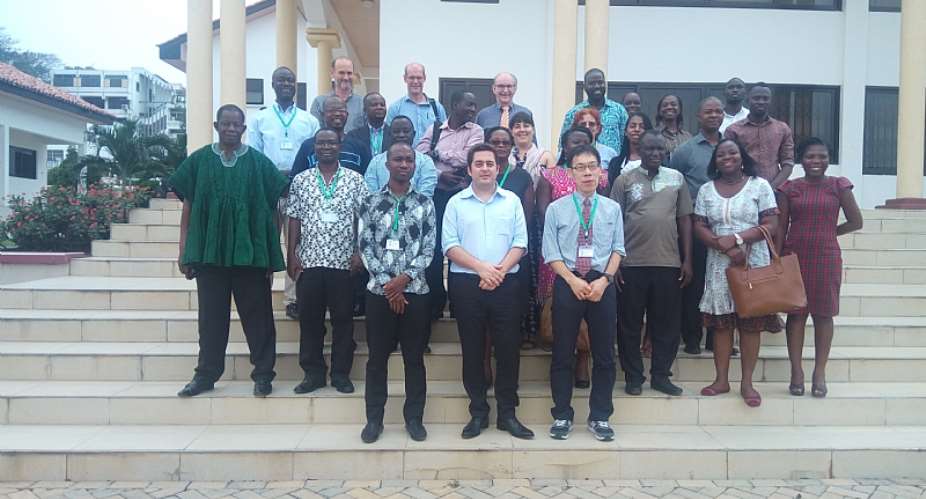Food Security Impacts of Industrial Crop Expansion in Sub-Sahara Africa (FICESSA) has organised a stakeholder workshop on the “Impacts of industrial crop expansion in Ghana.”
The two-day session was held at the Institute of Statistical, Social and Economic research at the University of Ghana.
The workshop was held to discuss findings from a three-year research project that sought to analyse the impact various industrial and food crops have on food security as they compete for land in the sub-Saharan region.
One of the facilitators and co researcher on the project, Dr Yaw Agyemang Boafo, speaking on the relevance of the workshop, said it presents an opportunity to share their findings and collate feedback.
This he believes would enable make substantial recommendations to key stakeholders.
“ ..What we seek to do eventually is that we want to give these findings out to relevant stakeholders. That's how come we are organizing this stakeholder forum to share our findings with them, to receive some feedback based on existing projects so that at the end of the day we can come up with a very good recommendation to different stakeholders on the way forward …”
Prof G. Kranjac-Berisvljevic of the University For Development Studies, a participant, said the workshop presented first-hand information on the many failed agric projects that have been executed in the country and learning opportunities they present for future project prospects.
“The program has been useful so far because we have mainly reviewed failed projects and you learn more from failure probably more than success. One thing we could take from here is that the programs that have been successful in Burkina Faso for instance have not been successful in Ghana so obviously there is something that we have not been doing right because for the same crop we have two different results.”
Commenting on how the information from the workshop could influence food security she added that, “We need to produce more food… but maybe to do it in a better way than what we have been learning from these failed stories. We need to reexamine the way we implement certain initiatives and so on.”

For James B. Y. Wiyor,the Executive Director of the Cotton Development Authority, the workshop brought to bear the many challenges in the agric sector, particularly in cotton production, and also created an opportunity for deliberation on possible solutions.
“From what we are learning, it is quite clear that a lot of people are currently involved in the cotton industry now, studying what the problems are. So it's brought out the problems are and we all as a group are trying to find out solutions to the various problems. So automatically if you have a problem and there are so many people helping you to find solutions to it; it's very contributive… so the workshop is very useful.”
Background
FICESSA is a 3-year interdisciplinary project that aims to provide clear empirical evidence of how industrial crops compete for land with food crops in Sub-Saharan Africa, and the mechanisms through which this competition can affect food security, whether in a positive or a negative way.
It will undertake studies at multiple spatial scales using various analytical tools to study past dynamics and explore future scenarios.
FICESSA includes comprehensive case studies of different operational industrial crop projects in Ghana, Malawi, Mozambique and Swaziland.
FICESSA will also undertake scoping surveys in Burkina Faso, Guinea and Ethiopia that focus on institutional issues related to industrial crop production and its linkages with food security.
FICESSA's vision is to produce knowledge that will be directly used by key stakeholders to improve the food security outcomes of industrial crop production in Sub-Sahara Africa, particularly for poor and vulnerable people.
Its consortium consists of partners with complementary strengths in academic, applied and policy-driven research that will allow the effective communication of key findings to different stakeholders including policy-makers, local communities, NGOs and the private sector.
Aims and structure
FICESSA aims to provide clear empirical evidence of how industrial crops compete for land with food crops in Sub-Sahara Africa, and the mechanisms through which such land use changes affect food security.
It studies food security outcomes across different industrial crops (sugarcane, jatropha, cotton, tobacco), modes of productions (large plantations, smallholders, outgrowers), spatial (local, national, regional) and temporal scales (historical analysis, scenario modeling) using various analytical approaches.
–
By: Michael Ogbodu/citifmonline.com/Ghana





 Dumsor must stop vigil part 2: We’ll choose how we demonstrate and who to partne...
Dumsor must stop vigil part 2: We’ll choose how we demonstrate and who to partne...
 2024 elections: NDC stands on the side of morality, truth; NPP isn't an option —...
2024 elections: NDC stands on the side of morality, truth; NPP isn't an option —...
 Akufo-Addo has moved Ghana from 'Beyond Aid' to ‘Beyond Borrowing’ — Haruna Idri...
Akufo-Addo has moved Ghana from 'Beyond Aid' to ‘Beyond Borrowing’ — Haruna Idri...
 Train crash: NDC is full of evil mindset; driver who 'deliberately' parked the c...
Train crash: NDC is full of evil mindset; driver who 'deliberately' parked the c...
 Dumsor: Energy Minister must be fired; it’s becoming unbearable — IES
Dumsor: Energy Minister must be fired; it’s becoming unbearable — IES
 #DUMSORMUSTSTOP: IMANI responds to Yvonne Nelson's call for a joint vigil
#DUMSORMUSTSTOP: IMANI responds to Yvonne Nelson's call for a joint vigil
 'Obiara b3didi' — Manhyia South NPP Chairman fights for resourcing of NPP grassr...
'Obiara b3didi' — Manhyia South NPP Chairman fights for resourcing of NPP grassr...
 Dumsor: This thing is becoming unbecoming, collapsing our business — Nana Ofori ...
Dumsor: This thing is becoming unbecoming, collapsing our business — Nana Ofori ...
 Dumsor: It'll be no more by the end of April — Gideon Boako assure Ghanaians
Dumsor: It'll be no more by the end of April — Gideon Boako assure Ghanaians
 "I can now see clearly with my two eyes, thanks to the generosity of Afenyo-Mark...
"I can now see clearly with my two eyes, thanks to the generosity of Afenyo-Mark...
